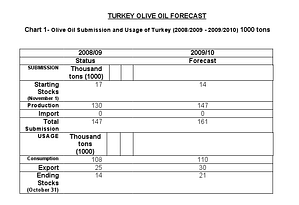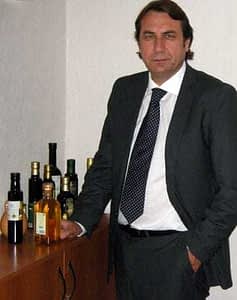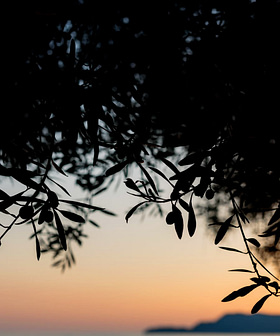After Turkey left the International Olive Oil Council in 1998, the National Olive and Olive Oil Council (UZZK) was organized. Today, it has become one of the main organizations in Turkey that help to develop the olive oil industry and culture. Dr. Mustafa Tan, Chairman of National Olive and Olive Oil Council, agreed recently to answer questions about the organization and the olive industry in Turkey.
OOT: How and why was the National Olive and Olive Oil Council established?
Dr. TAN: Due to the needs of the sector, National Olive and Olive Oil Council (known as UZZK in Turkish) was established as a reflection of a strong civil society initiative. On June 1st, 2002, Adatepe was the place for our first meeting. Later, at meetings in Izmir, Aydın, Bursa, hundreds of industry representatives who aimed to establish UZZK, chose the executive committee. Many of our friends who were involved in that committee are currently working with us in the management for UZZK. Until then and worthy of this trust, we have been working to develop our olive industry. Our goal is simply to bring all segments of the industry together, find solutions for the problems of the industry legally and eventually make our country’s olive industry succeed to the throne where it deserves to be. In accordance with this goal, representatives of the olive industry came together with the support of the relevant institutes and organizations, including the Turkish Republic Ministry of Agriculture and Rural Affairs and created a milestone for our industry.
 Turkish olive sector have had issues and it sure will have in the future. Started as a leader of production and in the amount of trees in olive oil’s homeland Anatolia, it moved backwards to the fifth position after Spain, Italy, Greece and Tunisia. Our yield of olive and olive oil per tree is low and we still have problems regarding quality standards. However we still talk about these problems while we have the most suitable soil and climate conditions for producing the best olives and olive oil. There are still thousands of houses that beautiful olive oil has not entered yet and millions of people who do not know enough about olive oil. As a first step, we would like to raise our olive oil consumption from 2 – 3 kg to 5 kg per person and be able to consume what we produce.
Turkish olive sector have had issues and it sure will have in the future. Started as a leader of production and in the amount of trees in olive oil’s homeland Anatolia, it moved backwards to the fifth position after Spain, Italy, Greece and Tunisia. Our yield of olive and olive oil per tree is low and we still have problems regarding quality standards. However we still talk about these problems while we have the most suitable soil and climate conditions for producing the best olives and olive oil. There are still thousands of houses that beautiful olive oil has not entered yet and millions of people who do not know enough about olive oil. As a first step, we would like to raise our olive oil consumption from 2 – 3 kg to 5 kg per person and be able to consume what we produce.
OOT: What kind of work does the UZZK do in Turkey?
Dr. TAN:UZZK is creating a collective consciousness and common address among the public, NGOs and private sector in order to;
- Develop stronger structure for olive industry in Turkey,
- Support creating brands for product marketing,
- Develop olive and olive oil production, consumption and trade,
- Ensure the integration of domestic and international market for producers and industrialists,
- Realize the harmony with European Union olive and olive oil common market formation,
- Increase the competition with the world market by creating development plans,
- And solve the product problems by reporting them to Agricultural Support and Guidance Committee.
By getting together in accordance to the 5488 Limited Agriculture Act and the National Olive and Olive Oil Council Foundation and Principles of Regulation” provisions, we started establishing the first product council and continue our work with the realization of the 1st Ordinary General Assembly on 12th of November, 2007 and as of today completed our third year of activity.
When we look back at the last three years, we witness so many problems (past and current) of the industry and yet a willingness to solve these problems. As you will appreciate, the olive industry in our country has to go through this difficult process by competing with the giants. In this process, quality, efficiency, standardization will become more important than ever, especially the methods that are compatible with the environment and producing quality products will be the most spoken subjects. While Spain, Italy,Greece is slowing down even under the security umbrella of European Union, Turkey’s olive industry is raising the bars by transferring information, technology and other material supplies.
Because of the global warming pollution and drought stress, we had 130 thousand tons of olive oil from 150 million olive trees last year. And this year, by gaining 147 thousand tons of olive oil, we are happy to get closer to the European Union countries. Also in the last two years, around 320 – 400 thousand tons of olive for table production has been achieved. Because olive and olive oil industry are much more talk in the country now, and the new investors are spending lots of effort to market their products, domestic annual per capita consumption has raised from 1 liter to 1.5 liter. There’s no doubt that the common goals and efforts of our council and Agriculture and Rural Affairs Ministry, are helping the rapid growth of the industry in our country.
OOT: How is Turkey doing with the olive oil production and consumption at the moment?
Dr. TAN:According to IOC (International Olive Council) sources, with its 5 % share of olive oil production in the last two years, Turkey is on the third row with Tunisia ( 5.5 %) after EU (73%). When it comes to olive for table production, EU has a share of 33 % and Turkey is following that by its 17 % of share, the same as Egypt. And Turkey is the number one country in the world for producing black olives.
About the consumption, IOC statistics are telling that EU is number one with 64 %, followed by USA with 9 % and Turkey with 3 %. Another fact is that 25 % of the world consumption of table olives is being provided by EU while 11 % is provided by Turkey followed by the USA ( 10 %) and Egypt.
OOT: Has the olive industry been effected by the financial crisis?
Dr. TAN:Luckily, the olive oil industry in Turkey has achieved to increase production for the last two years in spite of the crisis. Domestic consumption has increased as well as the export of patented and packaged products entering into new markets.
OOT: What kind of work should be done in order to increase the sales in Turkey?
First of all, we are trying to create an awareness in terms of olive oil’s quality advantages and healthy benefits comparing to the other type of oils. “Vinolive” fair that’s held every year with our coordination, has great importance for introducing and marketing olive oil to domestic and international markets. There will be a specialized olive and olive oil fair called OLIVTECH in Izmir between 1st and 4th of December, 2010. I strongly believe this fair will help the industry globally and so many world-wide organizations, including IOC will know more about the olive and olive oil industry in Turkey. We continue to create workshops, seminars and panels to create more awareness.
Since February 20, 2010 Turkey has become a member of IOC again. From now on, we will work on collaborative projects for marketing nationally and internationally with the multiplier effect of IOC. UZZK will be coordinating these types of promotion campaigns. On the other hand, we are still working on working against imitations of olive oil by the law in order to converge with EU standards. Our Quality Control Programme goes parallel to IOC’s programme and it will be published as a white list by UZZK. Soon, all the world will learn that the world’s highest quality and the most natural olive and olive oil have been produced in Turkey.
OOT: Can you assess the government support to the industry?
Dr. TAN: For the first time a Minister of Agriculture has also pronounced the goal of becoming second best after Spain which have been directed to, and accepted by, the UZZK and all of the representatives of the sector. During his speech at Adana Olive Summit, Mr. Mehdi Eker, Minister of Agriculture and Rural Affairs, said that the industry can be institutionalized with the inure of National Olive and Olive Oil Council Regulations and it’s necessary to move forward in the industry before we become a member of EU.
By 2014, the ministry have determined the goals for olive industry as follows;
- Olive field: From 700 thousand ha to 1 million ha
- Olive Tree Amount: From 140 million to 180 million
- Table Olive Production: From 400 thousand tons to 650 thousand tons
- Oil Olive Production: From 800 thousand tons to 3 million tons
- Olive Oil Production: From 115 thousand tons to 750 thousand tons
- Olive Oil Export: From 70 thousand tons to 300 thousand tons
- Table Olive Export: From 50 thousand tons to 200 thousand tons
- Efficiency per tree : From 12 kg to 25 kg
- Olive Consumption per person: From 1 kg to 5 kg ( in other words 250 thousand tons)
- Table Olive Consumption: Will be increased to 6 kg.
We are happy to see that our ministry is also uttering the same goals for our industry. Of course it’s important that the industry should be supported during this process. Therefore it’d helpful and needed to analyze the future better and take actions according to that.










